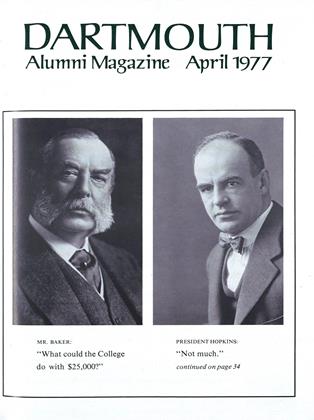For the first time in the recent history of the College, there is to be a contest between candidates for the office of Alumni Trustee, with the preference of the entire alumni body to be solicited by a mailed ballot.
At the instigation of the Committee for Equal Access, a student organization formed to protest the Trustees' decision to limit the increase of women students, a group of alumni has nominated a candidate to run against George Munroe '43, the nominee of the Alumni Council. Their candidate is the Reverend Pauli Murray, who last year was awarded an honorary doctorate of laws from the College.
It is the first time in a century - and only the second in Dartmouth's history - that a nominee for Alumni Trustee has been an alumnus by virtue of an honorary rather than an earned degree. In 1878 Hiram Hitchcock, a New York hotelman, founder of Mary Hitchcock Memorial Hospital, and recipient of an honorary A.M. in 1872, was one of the first group of Trustees nominated by alumni. The Board had finally agreed to allow the alumni to nominate candidates for a few Trustee vacancies, following an extended period of turmoil during which the alumni were vigorously protesting their lack of a voice in the governance of the College.
According to procedures established in 1916 but never before implemented, within two months of the publication in the ALUMNI MAGAZINE of the name of the Alumni Council's nominee, any 100 qualified alumni may file a petition for the nomination of another alumnus. If such a petition is received, the secretary of the Alumni Association is directed to send each alumnus qualified to vote a ballot containing the names of the candidates.
According to association secretary J. Michael McGean '49, the ballots, along with biographical sketches of Murray and Munroe, should be in the mail by the middle of this month. The deadline for their return is May 16, after which date the votes will be counted and results of the balloting forwarded to the Board. The Trustees will then elect the new member to fill the vacancy which will be left when Chairman F. William Andres '29 retires in June.
If this procedure constitutes a break in precedent, the nominee-by-petition is a woman accustomed to breakthroughs. On top of a distinguished career as an attorney, law professor, scholar, poet, and civil-rights worker, Pauli Murray became a member of the first group of women - and the first black woman - to be officially ordained a priest by the Episcopal Church. Born in 1910 the granddaughter of a slave, she received her bachelor's degree from Hunter College in 1933, her LL.B. from Howard University in 1944, an LL.M. from Berkeley in 1945, and a J.S.D. from Yale Law School in 1965. Then in 1973, she resigned from an endowed professorship at Brandeis University to enter General Theological Seminary, which granted her a master's degree in divinity cum laude in 1976.
Her opponent, George Munroe, is chairman of the board of Phelps Dodge Corporation. Following Navy service, he took his law degree at Harvard in 1949 and went on as a Rhodes Scholar to earn a degree from Oxford. From 1951 to 1953 he was an attorney in the office of the U.S. High Commissioner in Bonn, Germany, and the following year became a justice of the U.S. Court of Restitution Appeals of the Allied High Commission in Nuremberg. He joined Phelps Dodge in 1958 after four years with a New York law firm.
Notified by McGean of her nomination, Murray has indicated her willingness to be a candidate. "Obviously," she wrote, "those who used the petition method of nomination were seeking to bring to the Board of Trustees a person representative of two major thrusts of Dartmouth College educational policy: to increase educational opportunities for women and for Negroes/Blacks." She noted her awareness "that my candidacy represents a challenge to traditional procedures and that it is quite possible that I will not win." After outlining her experience with institutional financial development, she added: "My greatest concern, however, as an educator is the human product your institution is turning out, and it will be in that area that I can make my most creative contribution if I am elected."
For want of a shoe things went badly for Richard III on Bosworth Field. The Dartmouth crew, however, casually leaves its footwear dockside while out on the river.
 View Full Issue
View Full Issue
More From This Issue
-
 Feature
FeatureAffirmative Action
April 1977 By MARY ROSS -
 Feature
FeatureMr. Hopkins Builds a Library
April 1977 By CHARLES E. WIDMAyER -
 Feature
FeatureIf you spent the winter in Buffalo, Imagine This
April 1977 By THOMAS SHERRY -
 Feature
FeatureThe Road Not Taken
April 1977 By JOHN S. MAJOR -
 Article
ArticleBetween Seasons
April 1977 By JACK DEGANGE -
 Article
ArticleTopeka Takes On the Hun
April 1977 By NICK SANDOE '19








